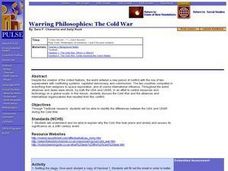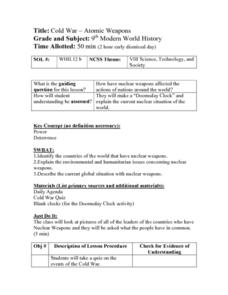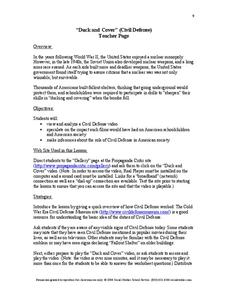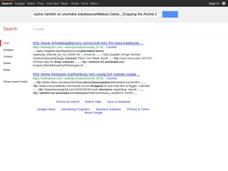DocsTeach
President Reagan and the Cold War: Vision and Diplomacy
After years of boiling tension, the presidency of Ronald Regan and the rise of Mikhail Gorbechev paved a new way forward for diplomacy between the United States and the Soviet Union. Using primary source documents, including letters...
Curated OER
The Cold War And Beyond
Young scholars interview an adult that grew up in the United States during the Cold War to develop an understanding of the concept of mutually assured destruction. They focus the interview on how the person dealt with the threat of...
Curated OER
The Cold War (1945–1963)
For this online interactive history worksheet, students respond to 8 short answer and essay questions about the Cold War. Students may check some of their answers on the interactive worksheet.
Curated OER
What Was the Cold War About?
Students explore a website to gather some first impressions of the Cold War era and its impact on Canadian society and politics. They, in groups, answer questions about the Cold War on a worksheet imbedded in this plan.
Curated OER
The Cold War at Home
Eleventh graders discover the perspective of Cold War on the American homefront. In this Cold War lesson plan, 11th graders watch Duck and Cover video segments that instruct citizens what to do in case of nuclear attack. Students discuss...
Curated OER
Warring Philosophies: The Cold War
High schoolers explain why the Cold War took place and ended. They analyze its significance as a 29th century event. Students identify the differences between the USA and USSR during the Cold War.
Center for History Education
The Cuban Missile Crisis
Cold War tensions led to hostile actions. Scholars use primary sources to understand the Bay of Pigs and the Cuban Missile Crisis during President Kennedy's administration. The lesson provides primary sources and a graphic organizer to...
DocsTeach
Letter to Truman about the Manhattan Project
Delve into the past to understand the opposition to the Manhattan Project. An interesting activity is designed to be completed in pairs, groups, or individually. Scholars analyze historical documents, complete an online worksheet, and...
Curated OER
What Was the Cold War?
A study of the Cold War can helps students learn about history through interviewing people who lived through this period.
Curated OER
The Cuban Missile Crisis
Students explore facets of the Cold War. In this Cold War history lesson, students research a Cold War event in order to write a news story about the events that features direct quotations and images.
Curated OER
Debating the Bomb
Students research the repercussions of the development of the atomic bomb. In this history lesson plan, students read, reflect and discuss nuclear warfare and how it affected the population when it was introduced, as well as how it...
Curated OER
Cold War-Atomic Weapons
Ninth graders explore how nuclear weapons have affected the actions of nations around the world. They identify the countries that have nuclear weapons and discuss the humanitarian issues with nuclear weapons. Students create a "Doomsday...
Curated OER
Dropping the Atomic Bomb: The Decision That Defined a Presidency
Students interpret historical evidence presented in primary and secondary resources. In this World War II lesson, students research the implications of the use of nuclear weapons to end the war in the Pacific. Students determine...
Social Studies School Service
“Duck and Cover” (Civil Defense)
Bert the Turtle models for viewers the 1950s Civil Defense Duck and Cover strategy that was supposed to protect citizens from a nuclear blast. After viewing the video, watchers are asked to consider the motivations of the producers of...
Curated OER
Declaration of Power
Students examine the Korean nuclear escalation. In this current events lesson, students explore the nuclear arms race in Korea and the science that explains nuclear weapons.
Curated OER
Energy: Nuclear Power
In this energy and nuclear power activity, students, with a partner, discuss what thirteen energy terms mean and match those same terms to their definitions in the second activity.
Smithsonian Institution
Cuban Missile Crisis
The United States—specifically John F. Kennedy—played a large role during the Cuban Missile Crisis. A history resource poses questions that encourage critical thinking as well as in-depth analysis of images from the time period.
Curated OER
Explosive Knowledge
Young scholars examine China's suspected theft of American nuclear secrets, as a springboard for the creation of a research-based, multi-tiered timeline that traces the development, regulation, and use of nuclear weapons from the 1940's...
Curated OER
Defense Mechanisms
Young scholars examine the Cold War roots of the recent debate over the construction of United States and Russian missile defense shields. They begin by reading and discussing the article, Putin Says Russia Would Counter U.S. Shield.
Curated OER
Debating the bomb
Students research how the development of the atomic bomb affected people in World War II. In this American History lesson, students participate in a debate about the bombs use. Students investigate how it has affected...
Curated OER
Geography Application: The Cuban Missile Crisis
A complete activity! The class reads the provided text, then answers the 7 critical-thinking questions. Topics covered are interpreting informational text, reading comprehension, the Cuban Missile Crisis, and US Policy.
Curated OER
Kansas in the Movies, the Cold War Period
Students are instructed using a cross curricular type of lesson plan. The time period that they focus upon is the founding of the Soviet Union as a superpower in the world after WWII. The rise of communism is also taken into consideration.
Curated OER
Dropping the Atomic Bomb The Decision That Defined a Presidency.
Students examine historical evidence regarding the atomic bomb. In this Truman presidency activity, students research images and documents about the use of the bomb in Japan. Students write position papers that identify their stance on...
Curated OER
One Step Closer to a Treaty
Students speak objectively about the nuclear disarmament issue and interpret sections of the Nuclear Non-Proliferation Treaty. They become more informed by these discussions and readings on the nuclear

























